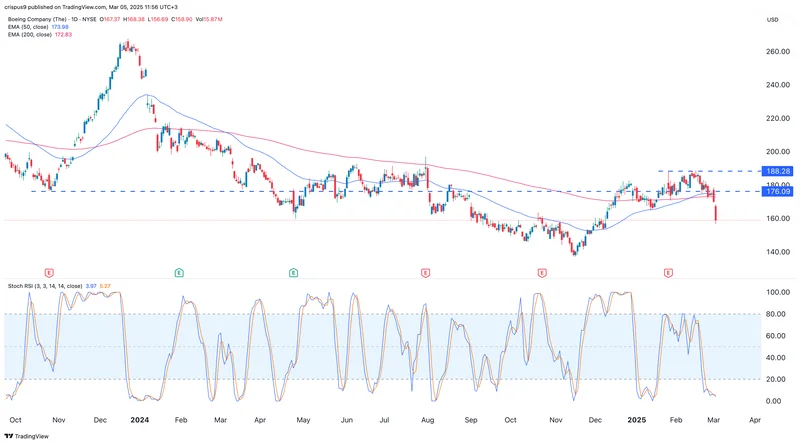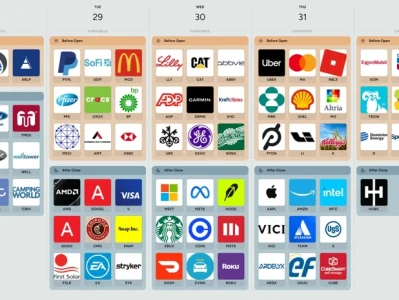When I was at MIT, we used to have these late-night debates about the future of manufacturing. We’d talk about robotics, AI, and the relentless march toward automation. But we always came back to one fundamental truth: for the most complex, most critical systems, you can’t just replace the human artisan. You can’t automate intuition, experience, or the kind of deep, tacit knowledge passed down from one generation of builders to the next.
It seems someone at Boeing missed those lectures.
What’s happening in St. Louis right now isn’t just another labor dispute. It’s a terrifyingly clear snapshot of a company at war with its own soul. For nearly three months, over 3,200 of the most skilled aerospace machinists on the planet—the people who build the fighter jets that defend the nation—have been on strike. And Boeing’s response? After rejecting the union's counteroffers, the company is now talking about hiring "permanent replacement workers" (Counteroffer Denied: Boeing Stock (NYSE:BA) Plummets as Boeing Looks For Replacements).
When I first read that phrase from Boeing Defense CEO Steve Parker, I honestly felt a chill. It's the language of commoditization, of treating irreplaceable human assets like they are interchangeable cogs in a machine. This is the kind of thinking that gets you a great quarterly report and, a decade later, a catastrophic failure of institutional knowledge. We are watching a high-stakes bet against the very people who make the company’s most vital products, and I have to ask: does Boeing truly understand what it's about to lose?
A Battle Over More Than Just a Paycheck
Let's get into the weeds for a moment, because the details here are what make the story so staggering. The International Association of Machinists and Aerospace Workers (IAM) isn't asking for the moon. They’ve been fighting for things like a 100% 401(k) match—a benefit their counterparts in Seattle already receive. They’ve even offered to take that off the table in recent counter-proposals, trying to find a middle ground.
Yet, Boeing won't budge. The company, which just posted a surprising revenue beat of $23.27 billion for the quarter, is playing hardball over benefits that seem, in the grand scheme of things, like a rounding error. Senator Josh Hawley put it bluntly when he confronted Boeing's Chief Labor Counsel, pointing out that the company was offering Missouri workers a deal with wage increases 16% below Seattle workers and bonuses that were $8,000 less. His question was simple and devastating: "What's different about these Missouri workers?"

The silence that followed speaks volumes. Boeing's strategy seems to be a brute-force attempt to break the union by threatening to replace them. But this is where the entire plan veers from corporate hardball into sheer fantasy. It’s like trying to win a Formula 1 race by firing your veteran pit crew and hiring mechanics who’ve only ever worked on lawnmowers. You can’t just pull people off the street to build an F-15EX. These jobs require years of training, specialized skills, and critically, security clearances—a process that involves deep background checks and vetting because these workers handle national secrets. To put it simply, a security clearance isn’t just a background check; it’s a formal declaration of trust from the U.S. government, and that trust isn't built overnight.
The idea that Boeing can quickly staff up a new workforce, get them cleared, and train them to the same level as the 3,200 people currently on the picket line, all while the original trainers are the ones on that picket line, is fundamentally absurd. This isn't just a miscalculation; it's a profound misunderstanding of the work itself.
The Ghost in the Machine is a Human Hand
This entire standoff reminds me of the early days of the digital watch. The old Swiss watchmakers, with their incredible mechanical artistry, were suddenly told their craft was obsolete. But it wasn’t. While the mass market moved on, the appreciation for true craftsmanship, for the human touch, only grew more intense. An Apple Watch tells time, but a hand-made Patek Philippe tells a story of human ingenuity. Boeing is treating its master artisans like they're assembling digital watches when they are, in fact, building the Patek Philippes of aerial warfare.
The consequences are already becoming clear. The U.S. Air Force has acknowledged that the 86-day strike has delayed the delivery of F-15EX fighter jets. Members of the U.S. House Armed Services Committee are now sending letters, pleading with Boeing to find a resolution, citing the threat to national security. Think about that for a second—the standoff has become so dire that Boeing faces more pressure from Congress as St. Louis workers strike nears three months • Missouri Independent, and the country’s defense is at risk.
This is the bigger picture that gets lost in the stock price fluctuations and earnings reports. We're talking about a breakdown in the very ecosystem that supports our national defense infrastructure. The knowledge held by these striking workers is a strategic asset. It’s the muscle memory of building a fuselage, the intuitive understanding of a complex wiring harness, the ability to spot a flaw no sensor can detect—it's the sum of thousands of careers spent perfecting a craft, and it's being treated as a disposable line item.
What happens when that knowledge walks away for good? What is the real, long-term cost of telling your most skilled people that they are, in the end, replaceable?
The True Price of a Broken Trust
This isn't a story about a company saving money. It's about a company forgetting what makes it great. Boeing's legacy wasn't built on contingency plans and replacement workers; it was built by generations of machinists, engineers, and designers who poured their lives into creating machines that defied gravity. What we are witnessing is a dangerous experiment to see if that human element is still necessary. I believe Boeing is about to get a very painful, and very public, answer. The question for the rest of us is what this means for the future of American innovation. If the hands that build our most advanced technology are seen as expendable, what future are we really building?

